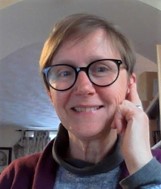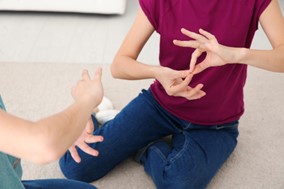Exploring the richness of Deaf culture
 So, this week being Deaf Awareness Week, got me reminiscing about my time as a British Sign Language (BSL) interpreter. It was such an amazing job to have, and I met so many extraordinary people.
So, this week being Deaf Awareness Week, got me reminiscing about my time as a British Sign Language (BSL) interpreter. It was such an amazing job to have, and I met so many extraordinary people.
Unique culture
The surprising thing I learned about the deaf community is that, like many linguistic minorities, Deaf people enjoy a unique culture, as worthy of respect as any other. The Deaf way of life is quite fascinating. Within the Deaf community there is a strong tradition of telling stories and jokes. Stories are often passed down from one generation to the next. Deaf people crave information and so meeting with others has always been an important part of their way of life – historically not having the same access to news and information as hearing people – it makes sense that they would want to be together and share stories.
The BSL language
Deaf people continue to campaign to get BSL recognised in the same way that other minority languages are, like Welsh. BSL is a language that evolves like any other language and has local dialects. It’s a different sign for ‘dog’ if you’re Bristolian than if you’re a Geordie.
BSL is a language in all true senses of the word and yet was only recognised as an ‘official’ language by the UK government in March 2003. However, it does not yet have any legal status unlike the Welsh, Gaelic, and Cornish languages which have legal protection.
A distinct lack of an interpreter at all the Government Covid briefings has caused the Deaf community to feel marginalized and ‘left out’.
A rich and strong community
 Learning sign language was a lifetime goal of mine – ever since I was about 10 or 11 years old – but I never knew how strong and rich Deaf culture is amongst the Deaf community, and I now understand why a linguistic minority values and holds on to the culture that makes them who they are. Some say the deafness is not a disability, it’s a community with its own language and culture.
Learning sign language was a lifetime goal of mine – ever since I was about 10 or 11 years old – but I never knew how strong and rich Deaf culture is amongst the Deaf community, and I now understand why a linguistic minority values and holds on to the culture that makes them who they are. Some say the deafness is not a disability, it’s a community with its own language and culture.
It’s pretty much a guarantee that Deaf people will be the last to leave party – carrying on their goodbyes on the doorstep, outside, in the car park! They can also be known for their directness, so don’t be surprised (or hurt) if a deaf person tells you that your new haircut doesn’t suit you!
Immerse yourself
I found a great video of two young deaf people talking about the difference between Deaf and Hearing cultures – there’s no voiceover or subtitles – but give it a go; sometimes it’s just nice to immerse yourself in something you don’t fully understand and see what you learn from it!
And, for something more – a TED talk from a Deaf American woman (with voiceover). She is using American Sign Language – each country has its own sign language, the same as spoken languages.
Learning disabilities
We can learn from and apply much of this, when supporting people with learning disabilities who don’t use words to communicate. After all, ‘listening’ means so much more than using our ears. Solo percussionist, Dame Evelyn Glennie, who is also deaf, says that we should think of our whole body as an ear – the people we support have found many ways to express their needs and wishes other than the usual ways of communicating; we just need to be open and free to understand.
Julie Plant
Head of Learning and Development

